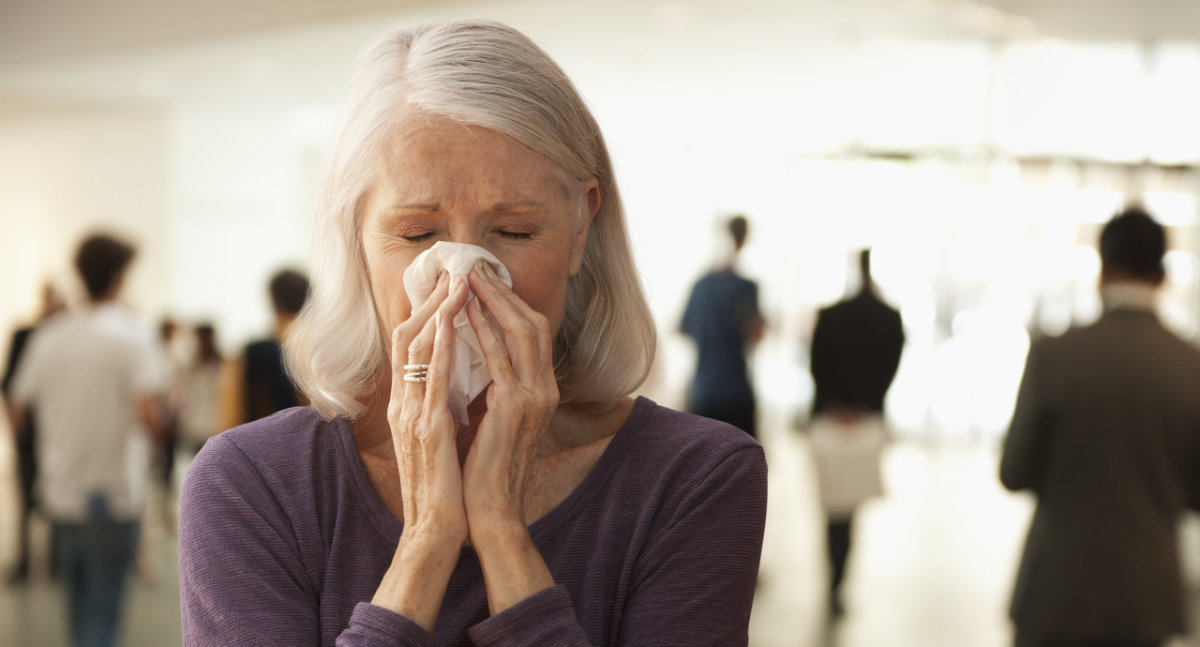We’re currently in the depths of winter, which means that cold and flu season is in full swing.
What is the flu?
Flu is a nasty and potentially dangerous infection, and its impact is often underestimated. Public Health England (PHE) says around 15,000 people died from flu-related causes in the UK last year, including complications such as pneumonia arising from an initial flu infection.
Also known as influenza, the flu is a viral infection that attacks the respiratory system and can leave you bed-bound and miserable for days. It usually has an incubation period of up to four days – which means it could be lingering in your system for several days before you actually realise you’re unwell.
Read Wise Living’s guide to natural ways to protect yourself from colds and flu.
What are the symptoms of flu?
The unpleasant cocktail of flu symptoms – which usually last from five to fourteen days – include a fever, cough, aching or sore muscles, chills and sweats, headache, dry cough, a runny or stuffy nose and a sore throat. Basically, it’s never fun to be the unlucky person that catches the flu at the start of a new year.

What should I know about the flu?
- When someone with flu coughs or sneezes, expelled droplets can infect people up to 6ft away.
- In the UK, the annual flu season runs from about October to March or April, although most cases occur between December and February.
- Flu leads to hundreds of thousands of GP visits and tens of thousands of hospital stays a year. But, if you’re otherwise healthy, the virus will usually clear up on its own within a week.
- The flu virus is extremely variable and changes over time. Each year there are different strains around, and a new vaccine has to be prepared to deal with them. Vaccination from previous years isn’t likely to protect people against current strains of flu.
- Oxford University’s Vaccine Knowledge Project says there are three basic types of flu: A, B and C. Type A is the most dangerous and can cause serious disease and trigger worldwide pandemics. Type B can make you feel very ill, but has never led to a pandemic, and Type C causes mild disease.
- Typically, effectiveness of the flu vaccine is in the range of 30-60%, and the NHS stresses having a flu vaccination won’t stop all flu viruses and the level of protection may vary, so it’s not a 100% guarantee that you’ll be flu-free. However, if you do get flu after vaccination, it’s likely to be milder and shorter-lived than it would otherwise have been.
- Side-effects of the nasal vaccine may include a runny or blocked nose, headache, tiredness and loss of appetite. The injected vaccine may have side-effects including a sore arm at the site of the injection, a low-grade fever and aching muscles for a day or two after the vaccination. Serious side-effects with either the nasal spray or jab are extremely rare.
- Last year, only 68.7% of front line NHS staff took up the free flu vaccination. NHS Employers has rolled out its Flu Fighter campaign aiming to encourage more health workers to have the jab.
- The European Commission estimates more deaths are caused by flu than by car accidents across the continent each year. Yet, around 100 million people recommended for the flu jab annually don’t take it up despite recommendations from the World Health Organisation.
- Research from the Universities of Lincoln and Nottingham suggests the flu vaccine can reduce the risk of having a stroke by about a quarter.
Read Wise Living’s guide to how to stop a cold developing – 6 ways to take on winter and win.
frequently asked questions about the flu
Here, we asked flu experts to explain everything you’ve ever wanted to know about this common infectious illness…
While there’s no way to guarantee complete immunity, there are steps you can take to make your life a flu-free zone and reduce your risk of getting struck down this January.
“The flu vaccine remains the best defence we have against flu and helps protect those who are more vulnerable,” says LloydsPharmacy pharmacist Anshu Kaura. “In order to protect yourself and your loved ones, it’s important to get a flu jab as soon as you can, as it can take up to two weeks for the vaccine to work.”
Besides the flu jab, Kaura says that maintaining a strong, healthy immune system is a key way to defend yourself against common bugs and viruses during the winter months. Unfortunately, there’s no magic ‘secret’ ingredient to a strong immune system, but rather a combination of nutrients – bolstered by a healthy diet – that work together to help fight infection and protect the body.
“Vitamins that are known to help support immunity include vitamin A which has anti-inflammatory properties that help regulate the body’s immune response,” says Kaura. “Vitamin E also plays an important antioxidant role in helping to support the immune system.”
Deficiencies of nutrients such as folic acid are thought to have an effect on the immune system too, so it’s wise to ensure your body has sufficient levels in the winter months.
For most healthy people, influenza is a nasty experience, but it isn’t life-threatening.
“Symptoms usually start to improve within 7 – 10 days but you may feel tired, weak and depressed for several weeks after,” says Dr Sarah Brewer, medical director of Healthspan.
“One of the best treatments for flu is rest,” stresses Kaura. “You should also ensure that you stay warm and hydrated, and seek relief from aches and pains.”
If your symptoms do not show signs of improvement after one week, make sure to call your local pharmacy or seek advice from a doctor.
“Due to the vast number of symptoms that flu can present, your pharmacist may recommend an ‘all in one’ medicine,” says Kaura. “If you’re taking a number of medicines, it’s important to be cautious of the ingredients each product contains, as to not take over the recommended dose.”
Flu can make you feel so exhausted and unwell that you have to stay in bed and rest until you feel better – and this is exactly what you should do. That way, you can recover quickly and avoid passing the virus on to your friends or colleagues.
Most – although not all – of those who become seriously ill are in at-risk groups which are offered free vaccinations on the NHS. And while the peak flu season doesn’t usually begin until December, now is the best time to get vaccinated, as it takes between 10-14 days for the immune system to respond fully afterwards.
The NHS says that, while the optimum time to have a flu vaccine is from the beginning of October to the end of November, if you have the vaccine later, it will still offer some protection.
And, contrary to some media reports, the NHS insists there’s no shortage of the vaccine, while supplier Seqirus says any remaining phased vaccine deliveries to GPs and pharmacies will have been completed by the end of this week.
The at-risk groups offered free vaccinations are adults aged 65 and over, people with long-term health conditions such as diabetes, asthma or heart disease and children in at-risk groups from six months of age, pregnant women, children aged two to nine years old, and carers of elderly and disabled people. They also include anyone living in a long-stay residential care home or other long-stay care facility.
Each year, the viruses most likely to cause flu are identified and the World Health Organisation (WHO) recommends which type of strains to include in the vaccine. This season there are three types of flu vaccine available, depending on your age and risk level.
PHE head of flu Dr Richard Pebody says: “Flu can be extremely serious and can kill the most vulnerable. Vaccination is by far the best defence we have. Anyone at increased risk from the effects of flu is offered the vaccine for free – speak to a GP or pharmacist, or look out for an invitation from your child’s school, to get yourself or your loved ones protected this winter.
“To help prevent the spread of flu, practice good hand hygiene. Catch coughs and sneezes in a tissue, throw the tissue away and wash your hands.”
Kaura says that while the flu jab isn’t guaranteed to keep you well, it can reduce your risk of getting the flu by 40% to 60%.
This means that you can still catch a case of the flu despite having the injection. If you do get the flu after vaccination, Kaura says that it is likely to be as a result of the flu strain mutating over the course of the season.
The good news is that if you’ve had your shot, but still catch the flu, your symptoms are likely to be far less severe compared to people who haven’t.
“The best time to get the flu jab is during October and November, however if you miss this time frame, getting the jab in December and January is not too late,” Kaura advises.
Whilst flu season typically starts from November, she notes that it can be difficult to predict when flu cases will peak.
Generally there’s only one flu strain circulating each year, however it’s possible to catch two different ones.
“Aussie flu, is a mutation of the flu virus which spread rapidly through the Australian winter and has now arrived in other parts of the world,” says Kaura.
“Symptoms for Aussie flu are like those of normal flu, but more severe,” she adds.
“It is also said to last much longer than the normal flu, and in some cases can lead to pneumonia, alongside other serious respiratory problems and other complications.”
In a nutshell: colds are milder.
“Both tend to cause a sore throat, cough, and runny or blocked nose, however with flu you may also encounter high fevers, chills, muscle pain, fatigue and nausea,” notes Kaura.
“A cold cannot turn in to the flu, as both illnesses are caused by a different virus, however the illnesses can often overlap, making it difficult to distinguish which virus you have.”
It isn’t common, but in some cases of flu can cause pneumonia, which can cause potentially life-threatening complications – especially for children, the elderly or pregnant women.
“Those that have a pre-existing condition such as asthma may find that their asthma symptoms worsen when they have the flu too,” says Kaura. “Equally those living with diabetes who experience the flu may have complications due to a weakened immune system and reductions in blood sugar levels due to reduced appetite.”































































